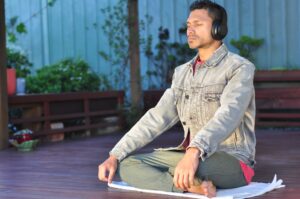Introduction
Welcome to “Understanding Yourself: Why Do I Feel Like I Observe More Than I Express?” This article dives into the heart of what many introverts experience: feeling like they’re more of an observer than a participant in their own lives. 🤔 For those who resonate with this, remember, your personality isn’t set in stone. The journey from introvert to extrovert, although challenging, is increasingly being embraced by many. This path, an introvert to extrovert transition, unfolds unique insights into our inner workings. We’re here to explore this transformative journey with clarity and straightforward wisdom. 🌟 Let’s begin this insightful exploration together.

Examining the Feeling of Observing More Than Expressing
Have you ever felt like you’re on the sidelines, watching life unfold rather than actively participating in it? This common sentiment among introverts can be both a source of strength and a subtle challenge. It’s the feeling of being an observer, often thinking and analyzing more than speaking out. This article aims to delve into this experience, helping you understand why you might feel this way and what it means for your personal growth and interactions.
For many introverts, observing more than expressing doesn’t just happen in social situations; it’s a fundamental part of how they process the world. They tend to absorb details, think deeply about them, and then form well-thought-out opinions. However, this process can sometimes lead to a delay in expression or a preference for not expressing at all, especially if the environment feels overwhelming or unsupportive. This isn’t about shyness; it’s about how introverts naturally interact with their surroundings and internalize their experiences.
Understanding this aspect of your personality begins with recognizing your natural tendencies. Are you someone who feels more comfortable listening than speaking in a group? Do you find yourself thinking deeply about a topic long after a conversation has ended? These are signs of an observational personality. Embracing this trait can be empowering, but it’s also important to recognize when it might be holding you back from expressing your valuable insights and participating fully in your life.
To gain a deeper understanding of your introverted nature, consider taking an advanced introvert test. This can provide more clarity on your specific traits and how they influence your behavior. Remember, being an observer is a unique strength. It allows you to see things others might miss and contribute in meaningful, thoughtful ways. This journey is about balancing your natural inclination to observe with the empowering act of expression.

Personality Traits of Observers vs. Expressers
In the diverse spectrum of human personalities, observers and expressers stand out for their distinct ways of interacting with the world. Observers, often introverts, are characterized by their reflective nature. They prefer to take in information, ponder over it, and understand it thoroughly before responding. This contemplative approach allows them to develop deep insights and thoughtful perspectives. In contrast, expressers, who are frequently extroverts, thrive on immediate interaction. They process their thoughts through dialogue, often thinking out loud and engaging actively with their environment.
Observers tend to be excellent listeners, absorbing not just the words but the emotions and subtleties behind them. They are usually detail-oriented, noticing nuances that others might overlook. This attentiveness can make them valuable team members, friends, and partners, as they often provide perspectives that are well-considered and insightful. However, they might struggle with being overlooked in fast-paced, speak-first environments where quick responses are valued over thoughtful reflection.
On the other hand, expressers bring energy and dynamism to interactions. They are often seen as the life of the party, sparking discussions and keeping the momentum going. Their ability to articulate thoughts quickly and react spontaneously can be advantageous in situations that require immediate decision-making or in social settings where lively interaction is appreciated.
For observers looking to balance their reflective nature with more expressive traits, joining a community of like-minded individuals can be beneficial. The intro to extro community offers a space where you can discuss and learn from others who are on a similar journey. Here, you can find support and encouragement as you explore ways to express your inner thoughts and feelings more openly, without losing the essence of your observational self. Embracing both these aspects can lead to a more fulfilling and balanced way of interacting with the world around you.

Challenges Faced by Observers in an Expressive World
Navigating a world that often values quick, outspoken responses can be challenging for those who naturally observe more than they express. Observers, typically introverts, may find themselves feeling overshadowed in environments where rapid-fire conversation and immediate reactions are the norm. This misalignment can lead to feelings of inadequacy or the misconception that their thoughtful approach is less valuable.
One significant challenge is the misunderstanding of silence. In many social and professional settings, those who speak up are often perceived as more confident or competent. Observers, who prefer to process information internally before sharing, might be mistakenly seen as disengaged or uninterested. This misperception can impact their social interactions, career advancement, and even self-esteem. It’s important for observers to recognize that their reflective nature is not a drawback but a different, equally valuable way of engaging with the world.
Another challenge is the internal pressure to conform. Observers might feel compelled to adopt a more extroverted approach, fearing that their natural tendency to listen and reflect might hold them back. However, forcing oneself to act against their intrinsic personality can be exhausting and inauthentic. It’s crucial to find a balance that allows for genuine expression while honoring one’s natural disposition.
To navigate these challenges, observers can benefit from strategies that help them assert their presence without compromising their natural tendencies. The intro to extro roadmap offers unique guidance in this area, providing practical tips and techniques that differ from conventional advice. This roadmap encourages observers to find ways to express themselves that feel authentic and comfortable, whether it’s through written communication, smaller group settings, or finding the right moment to share their well-considered thoughts. By leveraging their strengths and embracing their observational nature, observers can confidently navigate an expressive world, making their valuable perspectives heard and appreciated.

The Benefits of Being More Observant Than Expressive
While there are challenges to being more observant than expressive, especially in a world that often favors extroversion, there are also numerous advantages to this disposition. Observers, with their tendency to reflect and absorb information, bring unique and valuable skills to both personal and professional contexts.
Firstly, observers have the ability to process information deeply. This means they are often well-equipped to understand complex situations, noticing subtleties and underlying patterns that others might miss. Their thoughtful approach can lead to more thorough and innovative solutions to problems, as they take the time to consider all angles and implications.
Secondly, their listening skills make them excellent communicators in a different sense. By truly hearing and understanding others, observers can build strong, empathetic relationships. In a conversation, they are often the ones who can provide insightful feedback and support, making others feel heard and valued. This trait is particularly beneficial in leadership roles, where the ability to listen and understand team members is crucial for effective management.
Additionally, observers tend to be less prone to impulsive decisions. Their preference for reflection over immediate reaction can be a significant asset in environments where careful consideration is key. In both personal life choices and professional strategic planning, this can lead to more sustainable and well-considered outcomes.
Moreover, observers often excel in creativity. The quiet space they create for themselves allows for introspection and the nurturing of original ideas. Many artists, writers, and innovators credit their observational skills as a source of their creativity, finding inspiration in their careful examination of the world around them.
Embracing the strengths of being observant can lead to a fulfilling and impactful way of engaging with the world. Observers should recognize and value their unique perspective, understanding that their reflective nature is not just a personal trait but a significant contribution to the diverse tapestry of human interaction.
How Culture Influences Our Tendency to Observe or Express
Culture plays a significant role in shaping whether individuals tend to observe more or express themselves openly. Cultural norms and values can profoundly influence how we communicate and interact with others, often dictating what is considered acceptable or preferable in social and professional contexts.
In many Western cultures, for example, there’s a strong emphasis on extroversion. Traits like assertiveness, outspokenness, and being socially proactive are often valued and encouraged. This environment can be challenging for observers, who may feel pressure to speak up and participate in ways that don’t come naturally to them. The bias towards extroversion in these cultures can sometimes lead to a misunderstanding of the observer’s reflective nature, mistaking it for disinterest or lack of confidence.
Conversely, in many Eastern cultures, there is greater value placed on listening, humility, and thoughtfulness. In these societies, being reflective and reserved is often seen as a sign of wisdom and respect. Observers in such cultures may find their natural tendencies more in harmony with societal expectations, feeling less pressure to adopt a more expressive or extroverted persona.
Understanding these cultural influences is crucial for observers, as it helps them navigate social expectations and find environments where their natural communication style is more appreciated. It also allows for greater self-acceptance, recognizing that their way of interacting with the world is not only a personal trait but also a product of the cultural context they are part of.
For observers living in cultures that favor expressiveness, finding communities or subcultures where their reflective nature is valued can be beneficial. It’s important for them to seek out spaces where they can thrive and feel accepted for who they are. This cultural awareness can also help observers in developing strategies to adapt their communication style in different contexts, finding a balance that allows them to stay true to themselves while effectively engaging with the world around them.
Developing Self-Awareness About Your Observational Nature
Developing self-awareness about being more observant than expressive is a crucial step for individuals who find themselves in this category. It involves understanding and embracing your natural tendencies while recognizing how they impact your interactions and perceptions. This heightened self-awareness can lead to personal growth, improved relationships, and more effective communication.
The journey to self-awareness often begins with reflection. Observers can benefit from taking time to introspect about their reactions and behaviors in various situations. This could involve questioning why they prefer listening over speaking, what situations make them feel most comfortable to express themselves, and how they feel after social interactions. Journaling or speaking with a trusted friend or therapist can provide valuable insights into these patterns.
Recognizing the value of your observational skills is also important. Observers bring unique perspectives to conversations and situations, often seeing angles and depths that others may miss. Acknowledging this as a strength builds confidence and allows observers to contribute more meaningfully in both personal and professional settings.
However, self-awareness also involves recognizing when your observational nature might limit your experiences or hinder your expression. It’s about finding the balance between observing and participating, ensuring that you’re not just a spectator in your own life. Observers might set small, achievable goals for themselves, like sharing one thought in every meeting or initiating a conversation once a week, to gently push their comfort zones.
Moreover, understanding the impact of your observational nature on others can improve your relationships. Sometimes, friends, family, or colleagues may misinterpret your quietness for disinterest or aloofness. Clear and open communication about your natural tendencies can help alleviate these misunderstandings.
Ultimately, developing self-awareness as an observer is about embracing your natural disposition while also exploring ways to engage and express yourself when needed. It’s a balance that allows you to stay true to your nature while fully experiencing and participating in the rich tapestry of life.
Conclusion
In this exploration of why some of us feel we observe more than we express, we’ve delved into the intricacies of being an observer in a world that often prioritizes extroversion. Understanding this aspect of your personality is not just about recognizing your natural tendencies, but also about appreciating the unique strengths and perspectives you bring to the table. Observers have the ability to process information deeply, build strong relationships through empathetic listening, and contribute thoughtful insights in both personal and professional realms.
However, the journey doesn’t end with understanding and acceptance. It’s also about finding ways to balance your observational nature with the ability to express yourself. This balance is essential for fully engaging with the world around you, ensuring that your voice is heard, and your ideas are shared. It’s about finding comfort in your natural disposition while also challenging yourself to step out of your comfort zone when necessary.
Remember, the path from observing to expressing is unique for everyone. It’s not about changing who you are but about expanding your abilities to communicate and interact in various settings. By embracing both your observational skills and learning to express yourself, you create a dynamic and fulfilling way of experiencing life.
As we conclude this discussion, think of yourself not just as an observer but as a participant in the vast and diverse spectrum of human interaction. Each of us has a unique blend of traits that we bring to the world, and by understanding and utilizing yours, you contribute to the richness and depth of our collective experiences. Keep observing, keep learning, and keep expressing – each in your own unique and valuable way.




